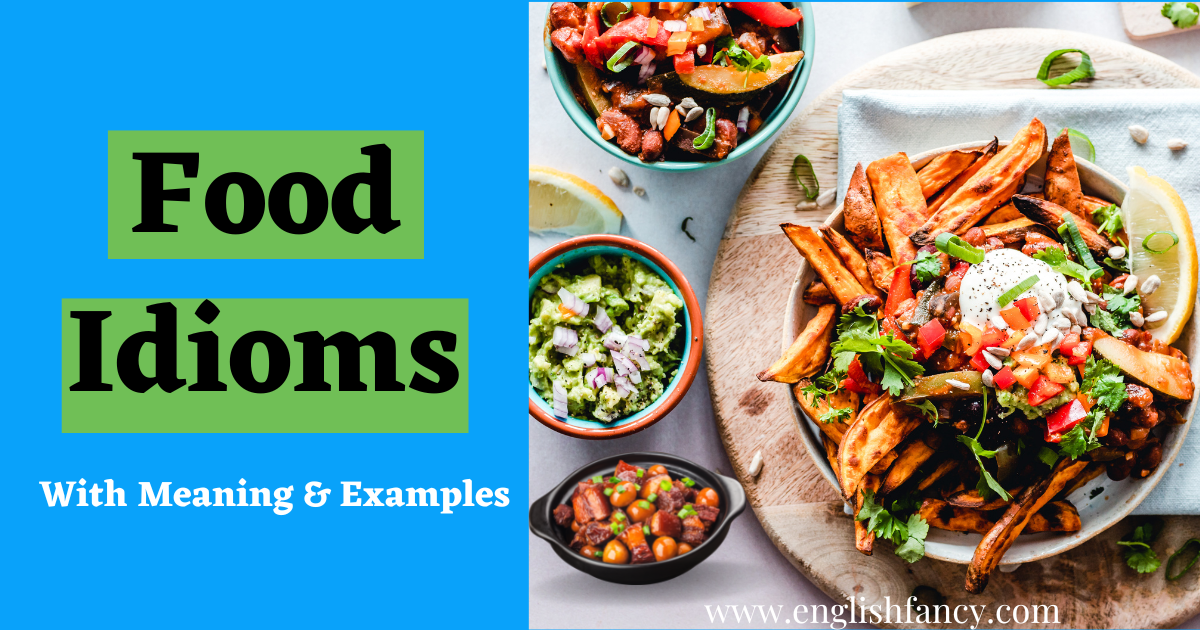Top 20 Food Idioms With Meaning & Examples
There are several idioms related to food. Using food idioms are fairly common in English and can be seen in everyday conversation. It will help you to improve your vocabulary.
Today, let’s learn 20 common food idioms with meaning which are mostly used in informal conversation. First of all, let us see the definition of English idioms.
Definition of an Idiom
“An idiom is an expression or a phrase that has a particular meaning which is different from the meaning of the individual words.”
Let’s have a look at some examples of food idioms which are given below and marked as bold for easy identification:
- Did you spill the beans?
- Painting is a piece of cake for me.
- I can’t play now as I have bigger fish to fry.
List of 20 Useful Food Idioms with Meaning and Examples
Learn the most common food idioms with meaning and examples which are given below:
1. A piece of cake
A piece of cake something that is effortless to do. This is one of the most common idioms. You can use this idiom when you find something is very easy to do.
Examples:
- I learnt music and it was a piece of cake
- It’s a piece of cake and I know that she can easily do it.
- Is leaning different languages a piece of cake for her?
2. Smart cookie
Someone who is too intelligent and clever who always makes good decisions as well as finds solution to problems.
Examples:
- He is a real smart cookie.
- Who is a smart cookie in your family?
- Wow! You totally became a smart cookie.
3. Spill the beans
Spill the beans means to reveal a secret information to others. In simple words, this idiom means telling a secret information to other people.
Examples:
- Don’t spill the beans!
- Why do you always spill the beans? It is really pathetic.
- Don’t worry! No one will spill the beans about her.
4. Bread and butter
“Bread and butter” simply means source of income.
Examples:
- Painting is my bread and butter.
- I’m going to teach the students as it’s only my bread and butter.
- Is teaching your bread and butter or something else you do?
5. A hard nut to crack
Someone or something that is really difficult to understand or difficult to deal with.
Examples:
- The fifth question was a hard nut to crack.
- That problem was literally a hard nut to crack, but finally I solved it.
- This exam is just hard nut to crack, but it doesn’t mean that impossible.
6. Cry over spilled milk
It means to be unhappy, worried about something that cannot be changed.
Examples:
- You have lost the phone, but it’s no use crying over spilled milk.
- Keep working because there is no use crying over spilled milk.
- Why are you still crying over spilled milk? Get over it.
7. Couch potato
A person who spends lots of time sitting or lying and watching TV.
Examples:
- Stop being a couch potato!
- Hit the books. Your exam is round the corner. Don’t be a couch potato!
- I’m sick and tired of her! She is utterly a couch potato!
8. As cool as cucumber
Someone who is serene and relaxed especially in a difficult situation.
Examples:
- You were furious whereas she was as cool as a cucumber.
- Just try to be as cool as cucumber because it is no use being furious in this time.
- Actually, he seemed to me as cool as cucumber.
9. Pie in the sky
We can use this idiom with something that is not realistic or that’s not going to happen.
Examples:
- His idea is only pie in the sky.
- Whatever you’re saying about it. It is only pie in the sky.
- Your plane is going to be pie in the sky!
10. Good egg
You can use this idiom for someone who is good, kind, and trustworthy.
Examples:
- What a good egg she is! I’m really thankful for all her help.
- Why don’t you be a good egg and helpful to others?
- I am really glad to know that he is such a good egg.
11. Bad egg
This idiom is just opposite of previous one idiom “Good egg.” Bad egg means a person who is not trustworthy.
Examples:
- I can’t believe that she is such a bad egg.
- I think you should not talk to him about it as he has become a bad egg.
- Never try to be a bad egg! You will regret for it for sure.
12. Take something with a pinch (grain) of salt.
If you are taking something with a pinch (grain) of salt that means you don’t totally believe it.
Examples:
- I take everything she says with a pinch of salt. She has a habit of exaggerating things.
- You really need to take that data with a pinch of salt.
- No worries! I took the information with a pinch of salt that is given by him.
13. In a pickle
It means to be in a difficult situation. You can use this idiom when you face difficult circumstance.
Examples:
- We were really in a pickle because we had lost the way.
- Thank you so much for being there with me when we were in a pickle.
- Today, I am in a pickle! I’m trying to find out the solution for it.
14. Cold fish
Someone who has very little emotions, who is regarded as hard-hearted person and seems unfriendly.
Examples:
- She never helps others. She is a cold fish.
- That man who has been working in my office for 5 years. He’s a cold fish.
- Are you really becoming a cold fish? I can’t believe it.
15. I have bigger fish to fry
It means to have more important thing to do. We use this idiom according to the subject.
Examples:
- I am not going to call you back because I have bigger fish to fry.
- She can’t go for the party tonight as she has bigger to fry.
- He has bigger fish to fry that’s why he is in a rush.
16. Butter someone’s up
It means to be so kind or friendly to someone so that the person will do what you want. In short, to praise or flatter someone excessively.
Examples:
- Are you trying to butter me up?
- She is not going to help you in your project, so don’t try to butter her up.
- I already knew it that why you were trying to butter him up.
17. Not my cup of tea
It means something which you don’t like, or you’re not interested. You can use this idiom according to the subject.
Examples:
- Watching horror film is not my cup of tea.
- Sitting in a dark room was not her cup of tea.
- Riding a bike is not his cup of tea because he is really afraid of falling!
18. Food for thought
Something worth thinking seriously about.
Examples:
- That great idea had given me food for thought.
- Your advice has given her food for thought.
- His result had given him food for thought.
19. Bring home the bacon
It means to earn the income.
Examples:
- Do you bring home the bacon?
- She can bring home the bacon. Don’t worry about it.
- I am still working hard so that I can bring home the bacon.
20. Big cheese
Big cheese means an important person in a company or an organization with a lot of influence.
Examples:
- She must be a big cheese.
- You are mistaken. He’s not a big cheese.
- His sister is a big cheese. I am really surprised!
Learn these useful idioms about food and use them in your conversation. The best way and easy way to learn is only practice continually.




